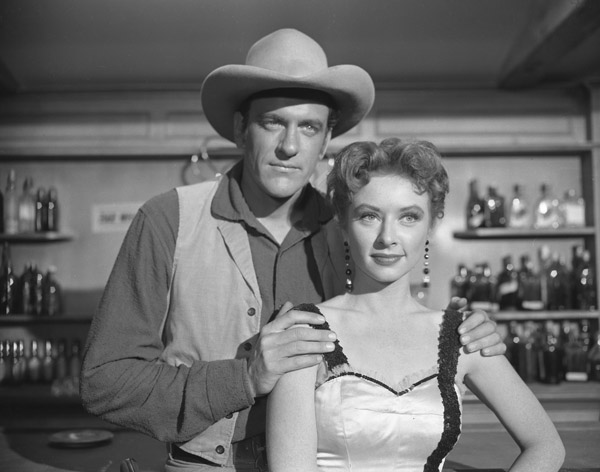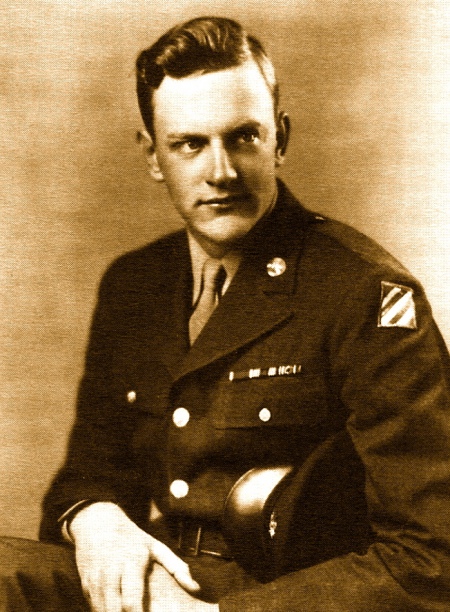Marshall Dillon (James Arness) and Miss Kitty (Amanda Blake) in the first season of Gunsmoke‘The Country Changes’
James Arness brought moral complexity to TV westerns in his portrayal of U.S. Marshall Matt Dillon on Gunsmoke
May 26, 1923-June 3, 2011
By David McGee
“Them railroads has come to stick in my craw, Matt. They’re takin’ jobs that cowhands oughta be doin’. Herdin’ cows into boxcars instead of crossin’ green grass just don’t make sense.”
“The country changes, Will.”
The first speaker was Will Parmelee, a grizzled rancher who had spent the night in the Dodge City jail after instigating a drunken brawl in the Long Branch saloon with a railroad engineer whose presence in the saloon the rancher and his two hired hands objected to.
The speaker dispensing the truth of the times in succinct fashion was the U.S. Marshall of Dodge City, Matt Dillon. In an all-too-typical exchange, he had awoken his “guest” Parmalee, his friend of 20 years’ standing, with a cup of fresh-brewed hot coffee, a sympathetic ear, and a realist’s wisdom.
The above exchange took place on an episode of Gunsmoke, the legendary TV series that aired from September 10, 1955 to March 31, 1975 on CBS, 635 episodes in all, the longest running series in TV history. The show was adapted for TV from a popular radio series that aired from April 26, 1952 until June 18, 1961 with William Conrad in the role of Matt Dillon. For the television version the series’ producers cast a physically imposing (at 6’7”) but unheralded B movie actor, James Arness, whose most prominent movie role had been as the title creature in the 1951 sci-fi thriller The Thing from Another World (popularly known as The Thing), a part for which he wore a head-to-toe costume that concealed all his features.
As a character actor, Arness had made an important friend in John Wayne, with whom he had co-starred in four films (Big Jim McLain, Hondo, Island in the Sky and The Sea Chase). When casting began for the TV version of Gunsmoke, Wayne recommended Arness, and then introduced the first episode of the then-half-hour black and white drama set in the unruly Kansas town of Dodge City, circa 1873. In his minute-and-a-half intro, Wayne said when he first heard about Gunsmoke, “I knew there was only one man to play in it--James Arness. He’s a young fella, and maybe new to some of you, but I worked with him and I predict he’ll be a big star. So you might as well get used to him, like you’ve had to get used to me.”
‘It’s honest, it’s adult, it’s realistic’: John Wayne introduces the first episode of Gunsmoke, September 10, 1995.In what became the most famous opening scene in primetime television history, Matt Dillon (Arness), filmed from behind and at a low angle that made him look even bigger than he was, was shown facing down a gunslinger in the streets of Dodge. The camera stays on Arness as something of a telling moment occurs: the gunslinger’s shot is heard first, then Dillon’s, and Dillon remains standing.
Throughout the series’ run, especially after it expanded to a one-hour series in 1961, Marshall Dillon was a model of restraint and thoughtful pragmatism, rarely shooting first, and often using his gun only when no other options were available. Interestingly, given his role in Hondo, based on a novel by the poet laureate of western writers, Louis L’Amour, Arness’s Matt Dillon resembled a new type of western authority that L’Amour championed in his books, one given to appraising the bad guys’ characters, trying to understand their motivations and hoping he could reason with them before matters turned violent. Another inspiration for Arness’s portrayal of Dillon may well have been the complex characters Randolph Scott portrayed in the spare, adult westerns director Budd Boetticher made at Columbia in the late ‘50s. Scott’s characters were more inclined to use wiles over guns to get out of a fix, and they recognized the world as being morally ambiguous and rejected the shoot-first-ask-questions-later ethos of the old Republic serials of the ‘30s as surely as they did the unsullied righteousness of singing cowboys such as Gene Autry. Cut from this mold, Arness’s Matt Dillon felt the world shifting beneath his feet and tried to guide those who resisted change into a new world they were often ill-equipped or too uneducated to comprehend. Whether dealing with an unreconstructed fast gun building a reputation on the bodies of innocent men he had killed or with landed gentry who grew up obeying only the laws they formulated for any strangers who wandered onto their property, Dillon remained the voice of reason, until pushed throw his weight and, if necessary, his gun around. In his introduction to a 1957 paperback edition of short stories adapted from Gunsmoke scripts (titled simply Gunsmoke), Don Ward noted how legendary Dodge City peace officers such as Wyatt Earp, Bat Masterston, Bill Tilghman and lesser knowns fired on others only when all other options had been exhausted. "They were more likely to disarm and arrest a man or subdue him wth a pistol-whipping, or, often, establish order out of turbulence by the sheer force of their arrival and presence on the scene. They were ready to sling lead if they had to. Generally, they didn't have to.
"Of such man-stuff, largely, is television's Marshall Matt Dillon. More on the thoughtful side, maybe. More concerned with the whys of men's actions, more aware of the limitations that beset human beings. More keenly alive to moral as well as legal responsibilities perhaps. Perhaps that is why he is so popular."
Surrounded by a stellar supporting cast--Milburn Stone as Doc Adams, the crotchety town physician; Amanda Blake as Kitty, the sultry owner of the Long Branch Saloon whose friendship with Matt was hinted at being more than platonic; colorful deputy sidekicks in, first, Chester Goode (Dennis Weaver) and, after Weaver left the show, Festus Haggen (Ken Curtis, a former member of John Ford’s troupe--and for a time Ford’s son in law--and of the beloved western vocal group The Sons of the Pioneers); Burt Reynolds as the half-breed blacksmith Quint Asper; Buck Taylor as a sometimes deputy and doctor--Arness grew into his role as Dillon and commanded it with authority as the series thrived. In a recent interview he mused about how inadequate he felt, given his limited acting experience, contending with the skilled actors from New York brought in to play his antagonists on the show.
Marshall Dillon faces down a Dodge City mobJames Arness died on June 3 at his home in Los Angeles. He was 88. In addition to Gunsmoke, he made some 50 films and television movies, predominately westerns, in a career that spanned five decades.
James King Aurness in Minneapolis on May 26, 1923, one of two sons of Rolf Aurness, who sold medical supplies, and the former Ruth Duesler. (His parents divorced in the 1940s.) James attended public schools and graduated from West High School in Minneapolis in 1942.
Arness’s younger brother was the actor Peter Graves, who starred for years on television in Mission: Impossible (a spy series set in the present day on which Graves played a taciturn character, Jim Phelps, much in the mold of a contemporary Marshall Dillon) and appeared in scores of movies, including Airplane! (1980). He died in March 2010.
In his first year at Beloit College in Wisconsin, Arness was drafted into the wartime Army as an infantryman. During the invasion of Anzio, Italy, in 1944, his right leg was shattered by machine-gun fire. Hospitalized for nearly a year, he underwent a series of operations but for many years suffered pain, especially when mounting a horse, and walked with a slight limp. He won the Bronze Star and the Purple Heart.
Serving as an Army infrantryman in WWII, James Arness was injured during the invasion of Anzio, Italy, in 1944, when his right leg was shattered by machine-gun fire. He was awarded the Bronze Star and the Purple Heart. The slight limp he walked with for the rest of his life became one of towering Matt Dillon’s trademarks.After the war he returned to Minnesota, took odd jobs and was a radio announcer before moving to Los Angeles in 1946. He began acting at an amateur theater and met the producer Dore Schary, who put him in a few movies in 1947. Unsure of his future, he drifted around Mexico, but returned to Hollywood, changed his name to James Arness, and began pursuing acting seriously.
In 1948 he married Virginia Chapman and adopted her son by a previous marriage, Craig. The couple had two children, Jenny and Rolf, and were divorced in 1963. In 1978 he married Janet Surtees; they lived in the Brentwood section of Los Angeles. She and Rolf Arness survive him, along with a stepson, Jim Surtees. Survivors also include six grandchildren and a great-grandchild. Jenny Arness died in 1975, and Craig in 2004.
Gunsmoke, opening credits for the hour-long showsCritics praised Arness’s performance as an unjustly accused man in The People Against O’Hara (1951), and he was memorable if unrecognizable in the title role of the science-fiction thriller The Thing From Another World, also in 1951. In the next few years he was in dozens of films, including the John Wayne vehicles Big Jim McLain (1952) and Hondo (1953).
Then one of Hollywood’s biggest stars, Wayne did not want to move to TV, but when told about the Gunsmoke TV project, he enthusiastically recommended his protégé James Arness. It was an inspired casting choice. Its 20-year run made Gunsmoke the longest-running scripted prime-time show in American television history, a record that stood until it was broken by The Simpsons in 2009. (Law & Order reached the 20-year mark in 2010, but was canceled before it could overtake Gunsmoke. No other show currently on the air comes close.) Besides reruns, it spun off books, board games, a trove of merchandise and endless nostalgia.
Gunsmoke, ‘Sarah,’ full episode from season 18, aired November 16, 1972, guest starring Anne Francis as Matt’s old flame. Quintessential Matt Dillon here, in the tender scenes with Sarah, and in his coralling of the bad guys.Arness was nominated for three Emmy Awards in the Gunsmoke years and later made dozens of television movies, including The Alamo (1987) and Red River (1988). He also starred in the mini-series How the West Was Won (1977) and the short-lived crime series McCain’s Law (1981). From 1987 to 1993 he also made five Gunsmoke television-movie sequels. James Arness: An Autobiography, written with James E. Wise Jr., was published in 2001.
In his June 3 obituary of Arness published in the New York Times, Robert D. McFadden summarized the archetypal western hero for a new age as embodied in Arness’s portrayal of Matt Dillon, the U.S. Marshall who sometimes found reality an implacable foe: a quiet, vulnerable lawman facing not stereotyped villains and clichéd situations but a chaotic frontier freighted with moral judgments and occasional failure. He might be too late to stop a killing. He could save a girl from kidnappers, but not from her father’s brutality. …Marshal Dillon never got the girl, did not love his horse, wore only one gun and fired it reluctantly, usually drawing last but shooting straightest in dusty street duels. Over the years, the marshal was shot 30 times.
On his website, www.jamesarness.com, Arness posted the following letter shortly before his death.
Hi friends,
I decided to write a letter to you for Janet to post on our website in the event I was no longer here.
I had a wonderful life and was blessed with some many loving people and great friends. The best part of my life was my family, especially my wife Janet. Many of you met her at Dodge City so you understand what a special person she is.
I wanted to take this time to thank all of you for the many years of being a fan of Gunsmoke, The Thing, How the West Was Won and all the other fun projects I was lucky enough to have been allowed to be a part of. I had the privilege of working with so many great actors over the years.
I was honored to have served in the army for my country. I was at Anzio during WWII and it makes you realize how very precious life is.
Thank you again for all the many letters, cards, emails and gifts we received from you over the years. You are and always have been truly appreciated.
Sincerely,
Jim Arness
Founder/Publisher/Editor: David McGee
Contributing Editors: Billy Altman, Laura Fissinger, Christopher Hill, Derk Richardson
Logo Design: John Mendelsohn (www.johnmendelsohn.com)
Website Design: Kieran McGee (www.kieranmcgee.com)
Staff Photographers: Audrey Harrod (Louisville, KY; www.flickr.com/audreyharrod), Alicia Zappier (New York)
E-mail: thebluegrassspecial@gmail.com
Mailing Address: David McGee, 201 W. 85 St.—5B, New York, NY 10024





